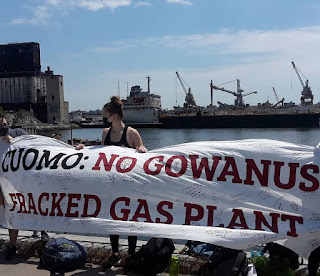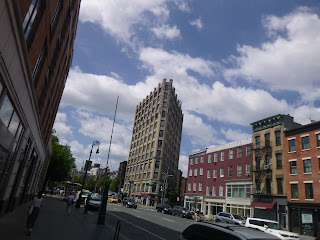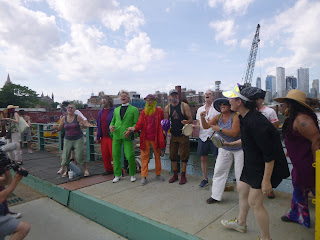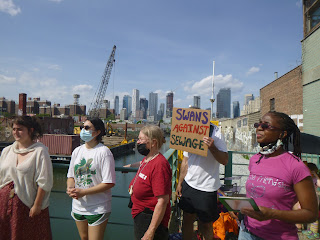"Fossil Free Day of Action...Let’s stop fossil fuel power plants for good. Join us in NYC for our May 21 Day of Action! After years of battles against fracked gas, the New York state legislature is considering a bill that would stop all new fossil fuel power plants. This bill, the Clean Futures Act (A6761/S5939), would prohibit the state from issuing permits to any new or expanded power plant that runs on fossil fuels. This landmark legislation would stop three fracked gas projects in their tracks—Danskammer, NRG’s Astoria Gas Turbines, and the Gowanus Repowering Project—and send a clear signal that New York is going renewable, and kicking greedy polluters out of our state. But the legislative session ends in less than a month. If we’re going to stop the Danskammer, Gowanus and Astoria plants with this bill, we need to pass it this year. It’s our people power versus polluters, and we need to up the pressure on our electeds! Join us for actions on May 21st to ban new fossil fuel power plants! There will be a rally outside the Gowanus power plant in the morning. ... Bring a mask; masks and physical distancing will be required. Gowanus Plant Rally 11:30am 699 Columbia Street, Brooklyn, NY Let’s show the governor and the legislature that we’re ready for a renewable future, free from polluting power plants that poison our communities."
Walking to Judson Memorial today, the
sun shone. The city felt alive. The kids
had been out skating all week, going to the beach, meeting in the parks,
listening to music; classes ended in this odd pandemic year. Barely Disfigured
opened. people out again. We were on our way to Judson for Donna's last service
there. Last service after 15 years. She was there when I first started coming,
back in 2006. Our teenager was not even born when she started preaching there
in 2005. And I found a home there, for community building and activism and arts
and singing and gossiping. A decade later, I ran into Donna in Paris during the
COP21 Climate Conference, where she preached about the theology of
sustainability and we all walked around the city. I read her book about
grassroots gardening before I came to Judson. I didn't know it was the
same Donnna Schaper, who I saw in church every week, who wrote the book.
Donna was there for Moral Mondays
events, for all the New Sanctuary actions for Jean and Ravi, checking in with Immigration
Customs and Enforcement, during prayers and concerns after Hurricane Sandy, all
those Sundays when the kids were growing up, or when Dad dropped by to see her,
week after week, month after month, year after year of sermons about the folly
of our desires and hopes and vanities. Engage your enemies; open yourself to
new ideas; reject dogmas or ideological rigidity - these were just a few of the
themes she preached about week in and week out, bringing a bit of her
no-nonsense Chicago Divinity School training to the conversation, a space we
all shared, looking forward and backward.
Ravi
Ragbir read the First Ancient Testimony from Jeremiah 29:4-9. Donna was with when he was detained by ICE,
when the police pulled him away and members of the congregation, joined by anarchists
blocking the police cars from taking him away.
“… seek the welfare of the city
where I have sent you into exile, and pray to the Lord on its behalf, for in
its welfare you will find your welfare."
We'll be ok when our city is ok and vice
versa.
Today
was going to be Schaper's
last at Judson The teenager was there with me, singing along.
"Fare-
well," said Donna. "The journey cost me all I had, everything I
had... And a hundred percent in return." Fare and well, Schaper explained,
riffing on the fares we pay, the ways we imagine wellness.
"Find
inner and outer peace," said Schaper. where
they both are, challenging issues with sustainability smart tactics.... It’s a
circle, outer peace and inner peace... plant gardens and live in them... It’s a
circle and a cycle.. we are a church that fares well.
Bill Talen and I saw her speak at Judson.
He's the one who brought me there, before I knew it was a
church.
Steve told to come to services there.
And she preached over
the years.
With a round of applause it was over.
And we left.
The teenager walked out to meet friends at Generation
Records.
I was off to celebrate Biodiversity Day on the Gowanus with
Rev Billy and Savitri and my friends from Voices of the Gowanus, talking about
what was wonderful and horrible and spectacular about this waterway under Union
Street Bride.
Hello Gowanus, Billy and his daughter say as they cross over
on the way to school.
What
do you love about the neighborhood, I asked.
Its
flowers or fabled oysters or its secret places,
Spots
where kids sneak off to look at the water,
To
smoke something or write a poem.
Or
find the treasures in the seaweed that Susanne showed Leonard.
Every
neighborhood needs spaces such as this.
They
are where we find ourselves in the city.
Before
its zoned away, let’s celebrate biodiversity day in advance of a city land grab.
Since
a rezoning was proposed in this neighborhood, we have organized, gotten the
word out about our environmental concerns about building housing along a flood
plane where the EPA worried about toxic coal tar still under the surface.
We don’t want another love canal here.
We’ve fought to get a temporary restraining order
and made sure the world knows the stake of big developers taking control of a
space.
We are calling for a real Environmental Impact Assessmentof the project.
This isn’t my first rezoning battle with rev Billy.
I
first started organizing with Billy and company when the city wanted to zone
away the rough edges from Times Square, leaving a neighborhood as bland as a
dentist’s office.
No
strippers not peace, we chanted.
And then we organized against the Williamsburg
Rezoning in 2004 when the city planned to put towers up along with waterfront
without adding infrastructure.’
We don’t want your stinking towers, we want space to
grow our flowers, we chanted.
And here we are today, without rezonings happening
across the city, with developers taking over neighborhoods and public spaces
from Govs Island to East River Park to Elizabeth Street Garden the Gowanus.
We want a real environmental impact assessment
before anything moves forward.
We
want open meetings … hearings we can all take part in, instead of being muted.
Lets talk about what this neighborhood means
Lets hear it.
Lets sing about it.
Dressed as a mermaid, @norasays (Nora Alameida)
explained:
"Even though the Gowanus
canal has become synonymous w/ industrial pollution and sewage...and these
large dredging boats are a (loud) and very visual reminder of the mess that
people can make of the environment, today is biodiversity day and we’re actually
standing above what used to be a natural creek than ran through a fertile
marshland.
Gowanus was a
sacred place to the Canarsee (it’s named for their chief, Gauwane) because of the diversity of species of
animals and plants that thrived here: birds, bivalves like clams and oysters,
grasses, mosses and algae, small mammals, and fish.
And Gowanus was
one of the first places in Brooklyn to be colonized by European settlers for
the same reason.
The Gowanus that
we see today is marked by the short sighted plans of the powerful who
(historically and still) engage in urban planning decision-making that benefits
the few at the expense of the many…
And yet when I
walk around Gowanus, especially knowing this history, I see life everywhere.
People making things, moss in the sidewalk cracks. Earlier this week, I walked
to see the sunset on 2nd avenue where it dead ends at the canal and a couple
warned me about a pair of mean Geese who were protective of 4 little goslings.
And I saw them again, the Geese family, just yesterday hanging out down by the
flushing tunnel.
This isn’t the marshland that it
used to be (and it never will be) but I like to notice the tide and the way it
changes, and I like to remember when I am biking up 3rd avenue that below the
road is land that used to be a sacred marsh. I like to notice the plants that
still grow here, beside the warehouses where people are right now making
candles and coffins and music. Or starting up their food truck or opening up
the restaurant where they work for lunch or roasting coffee beans or building
furniture. Or hanging out with their friends on the banks of the canal after
school next to a weed that is also a kind of wild carrot. I like the dandelions
and the “invasive” tree of heaven that was brought here from China that is
growing crooked and sure of itself next to the bridge where we’re standing now.
I like in fall when the plants
are drying to take a seed pod and open it and scatter its contents in a small
and forgotten patch of soil. I like the ducks at sunset although I worry about
them after the rain because of the sewage overflow. And I like worrying about
the people in canoes going under the bridges with the dredgers on the weekends,
because I know what’s in the water and that if you are near it too long, the
oil and gasoline that washes in with stormwater and floats on the surface will
make you light headed.
And I worry most
of all about what will happen, not because I’m afraid of “change” which is
inevitable and part of the bones of this City, but that we’re trying to plan
too much for the wrong reasons. I worry that we ignore what Gowanus was and is
and could be if it wasn’t only about the next city council race talking points.
I worry about that fracked gas plant and what will happen the next time this
whole place is underwater. And I worry that we’ll forget what this land, which
was stolen from the Carnarsee, is and that we’ll settle for something because
we think it’s the best we can get from a broken machine--this plan--that
doesn’t notice any of the things that we notice and that erases all of the
things that are still particular to this place and the community of people and
plants and animals that live here. That lived here.
So thank you for being here.
Thank you for paying attention. Thank you for celebrating with us."
And we all started improvising about
what comes next, a public hearing on June 3 at Old Stone House.
Billy and
Savitri and the choir reminded us of the flowers.
We talked about
the water and the light...
What’s your favorite flower, asks
Savitri.
Lilacs with fragrant violet,
pink, or white blossoms
“…there
is always something beyond dominating systems...” says Talen, referring to John
Berger’s sentiment, echoed by Susan Sontag and Edward Said.
Wearing a t-shirt declaring "Build friendships, not warships," Calista leads the choir singing, "Agua es vita."
Donald in red sings
along.
Martin reminds
us:
“Las Aguas de
Gowanas Non Say Venden.”
Some things are
not for sale.
On and on we
talked all afternoon, before sneaking off to hear jazz,
on
a gorgeous Sunday, with the world in constant flux.
There is another
city out there.
We can see it,
if we take our time to talk with our neighbors, finding those secret places,
those neighborhood societies where we grow.
June 3rd
is the public hearing for the Gowanus Rezoning at the old Stone House.
Be there at
three.
Farewell Donna.


























































































